Imprisoned Activist Reports Further Physical Assault
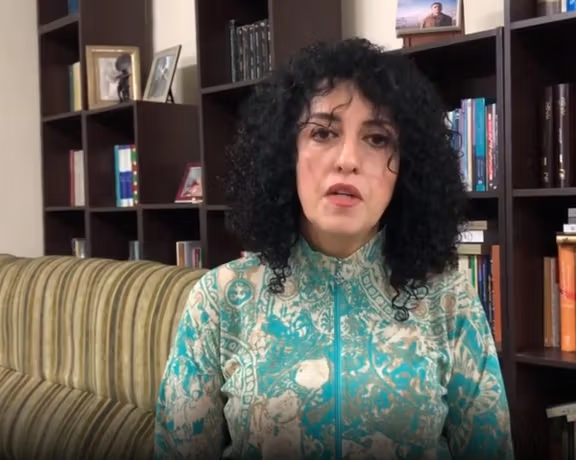
Renowned women's activist Narges Mohammadi claims she was physically assaulted on Monday for not adhering to mandatory hijab in the presence of prison authorities.

Renowned women's activist Narges Mohammadi claims she was physically assaulted on Monday for not adhering to mandatory hijab in the presence of prison authorities.
Mohammadi, who has repeatedly spoken out against human rights violations in Iranian prisons, including "sexual harassment and abuse of women" in detention facilities, was sentenced to an additional year of punitive imprisonment on charges of "advocating against the system through issuing statements from inside the prison."
The most recent incident was reported on her Instagram account. Mohammadi has become famed for raising awareness to the systematic abuse of women in Iranian prisons and in a bid to silence her, the authorities often refer to her as insane.
In recent years, innumerable reports have surfaced about the torture of political detainees and ordinary prisoners under various charges in Iranian prisons. Iran's Me Too Movement has also reported that sexual violence and intimidation has become a standard weapon against women by the regime, both inside and outside prison, with thousands of Iranian women seeking the support of the group since the unrest of September.
Mohammadi has published several letters from inside prison in support of the Iranian people's revolutionary movement, condemning the suppression of students and protestors, advocating for the rights of the Baha'i community, and others.
Iran's prison organizations issued a statement Tuesday dismissing the allegations.
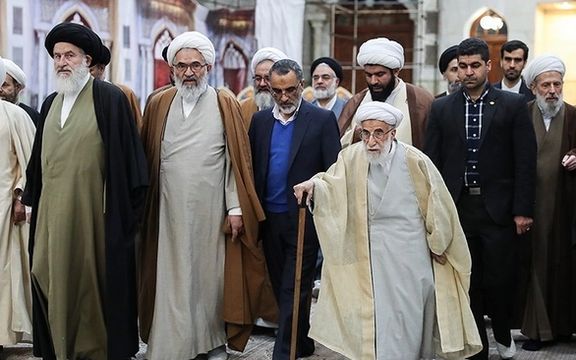
While many expect a dull Iranian election in March, some anticipate a notable showdown: Hardliner President Ebrahim Raisi against his predecessor, Hassan Rouhani.
The competition, however, does not take place in the parliamentary election, but in the simultaneously held Assembly of Experts where 88 clerics will be elected to a body most likely to determine Supreme Leader Ali Khamenei's successor at one point during its 8-year term.
Iranian journalist Ehsan Mazandarani's tweet highlighted the potential for a competition between Raisi and Rouhani should they both decide to run in the Tehran Province. Both individuals currently serve as members of the Assembly of Experts in the Tehran Province. It's worth noting that the Tehran Province has 16 representatives in the assembly, whereas the Province of Semnan has only one delegate.
Readers speculated that the Guardian Council might even disqualify Rouhani for the election to make sure that Raisi can make it to the Assembly smoothly without having to face Rouhani who appears to be more popular among the voters. A safe way out of trouble for Rouhani would be naming himself a candidate from his birthplace province of Semnan.
This makes sense, another reader pointed out, only if Iranians bother to take part in the March 2024 election. The latest two elections in Iran, the parliamentary vote in 2020 and the presidential election in 2021 had turnouts barely over 20 percent in most constituencies. That was too low in a country where an election turnout less than 60 percent was considered too bad.
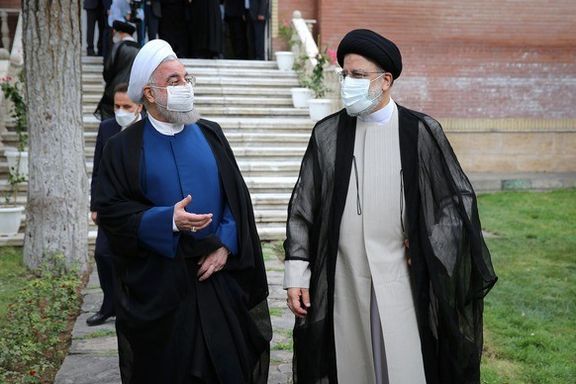
The disqualification of reformist and moderate candidates and the government's overwhelming biased campaign in favor of hardliners such as Raisi are said to be the reasons for the low turnout. With the massive protests in 2022 many observers are led to believe that the situation is likely to be even worse in March.
While there is significant concern among politicians regarding the parliamentary election and its turnout, there is a noticeable absence of discourse regarding the Assembly of Experts, where competition is minimal. Few Iranians can name three or four Assembly of Experts members, and even fewer are aware of the body's activities. Over the past 30 years, Khamenei has not permitted the assembly to scrutinize his performance. Rather than the Assembly supervising the leader's activities, it is Khamenei who imparts guidance to the Assembly of Experts during their annual meetings.
Some politicians, such as the Parties House Chairman Manouchehr Mottaki have politely and cautiously reminded that before deciding whether to take part in the elections or not, the people will look at the government's performance. What he meant was possibly the adverse impact of people's unhappiness about the government's economic performance which has made life difficult for nearly all walks of life in Iran.
Mottaki said that many Iranian political parties and their leaders fear that the March 2024 elections are likely to have low turnouts. Meanwhile, his comment about "some of the parties willing to take part in the elections," indicated that some of them may not be interested in the elections for the time being.
Equally pessimistic about the upcoming elections was hardliner politician Bijan Moqaddam who is close to the powerful core of the Islamic Republic. He said in an interview with Nameh News that the government's performance will have an impact on the election turnout. Meanwhile, to downplay the importance of the two last elections' extremely low turnout, Moqaddam said that the high turnout in the previous decades have raised people's expectations.
He remarked, "There are approximately six months left before the elections, and the government's actions could potentially stimulate increased participation." Moqaddam may have placed undue optimism in the Raisi administration's capacity to bring about positive change within this relatively brief timeframe.
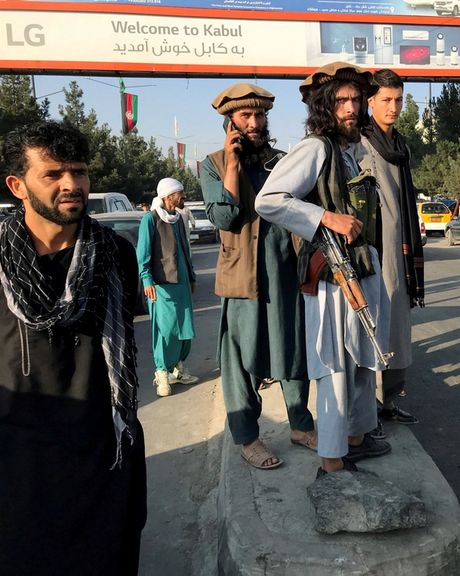
An Iranian daily has sounded the alarm regarding the potential danger posed by the Taliban along Iran's borders reflecting concerns in Tehran.
Jomhouri-e Eslami newspaper wrote of the critical need to address the issue, highlighting the risks posed to both the eastern regions of Iran and the broader geopolitical landscape, while Tehran usually downplays the issue in a bid to retain calm.
The editorial speaks of the plight of the people of the eastern part of the country and the prolonged water shortages they endure at the hands of the Taliban which continues to refuse to deliver Iran's water share from the Helmand River.
The newspaper claims that “safeguarding Iran's rights and ensuring border security while preventing the spread of negative consequences from the Taliban's authority in Afghanistan can be achieved through political means” in a call to arms to the nation.
Referencing the ruling Taliban leadership's two-year reign, the newspaper highlighted Afghanistan's 12% increase in the industrial production of narcotics and the surge in the production of methamphetamine. "This trend highlights the Taliban's reliance on the narcotics trade as a source of revenue, effectively engaging in drug terrorism," the newspaper wrote.
The editorial shows the regime's growing concern about its Afghan neighbors, which in May saw two Iranians killed and one Taliban soldier dead in a border dispute over water rights. In August, an aerial photo circulating on social media led to extensive criticism of the government for “conceding” thousands of hectares of Iranian land to the Taliban. The photo shows a 130 km long security wall built by Iran at some distance from the border demarcation line with Afghanistan which is along the Hirmand (Helmand) River.
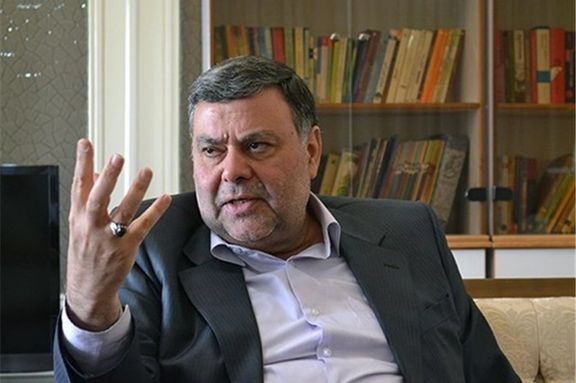
A senior official has acknowledged that Iran's plans to assume a leading role in the region by 2025 have fallen flat, blaming sanctions and ignoring impacts of nuclear issues.
Mohammad Sadr, a member of Iran's Expediency Council, made the remarks in reference to Iran's ambitious long-term development plan encapsulated in the Twenty-Year Vision Document of Iran, in place since 2005.
Initiated on the recommendations of the Expediency Council, an advisory board for the Supreme Leader which also settles disputes between Iran's parliament and Guardian Council over legislation, 2025 was meant to be the culmination of the grand plan.
However, Sadr said: “The realization that robust economic growth is imperative for establishing a stronger international presence has prompted these nations to actively seek foreign investments and attract foreign capital, leading to ongoing advancements in their economic landscapes.”
Heavily sanctioned for years, foreign direct investment (FDI) in Iran has been a major hindrance. Meanwhile, the United Arab Emirates, with a population of just 10 million, has dwarfed Iran to be MENA's top FDI nation.
According to the World Investment Report 2023 issued by the United Nations Conference on Trade and Development, the value of foreign direct investment inflows to the UAE in 2022 amounted to $22.737 billion, ranking 16th globally in FDI inflows in 2022. It was also ranked top in the West Asia region.
Sadr attributed Iran's failings on sanctions, saying that “countries eager to engage with Iran encounter impediments in expanding their relations due to concerns regarding potential sanctions-related repercussions, thereby impeding the development of these relationships.”
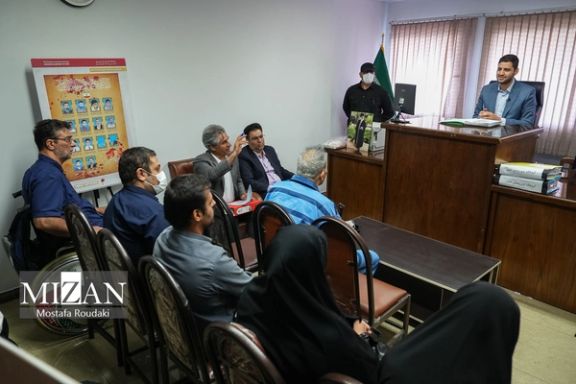
Several months after being sentenced to death, Jamshid Sharmahd, a dual national abducted in Dubai, has been given a new court hearing, with threats of additional charges.
Sharmahd, who holds German and Iranian citizenship, was abducted by Iranian agents in 2020, smuggling him to Iran. he was sentenced to death in February after being convicted of heading a pro-monarchist group named Tondar accused of a deadly bombing incident that occurred in 2008 at a religious center in Shiraz, killing 14 and injuring 215 more.
During his imprisonment, human rights organizations have raised concerns about the deteriorating health of the 68-year-old who has been held in solitary confinement with allegations of his being denied access to an independent attorney and fair legal procedures during his trial.
The US based activist whose group aims to restore the overthrown monarchy, toppled in the 1979 revolution, is believed to have been forced to confess to the charges against him, in line with innumerable cases under the regime. His family calls the allegations "ridiculous".
The Mizan News Agency quoted the judge presiding over the new hearing as saying the case is one seeking compensation and justice for the families of those lost in the 2008 bomb attack. “The case has been characterized as a lawsuit by families who have lost loved ones, witnessed injuries, or experienced disabilities in terrorist operations attributed to the Tondar group," judge Majid Hosseinzadeh said.
The issue of dual national hostages has resurfaced in light of the latest Qatar-brokered deal to free up $6bn in frozen Iranian funds in South Korea in exchange for five US citizens, leading to allegations that the Biden administration is playing a dangerous game encouraging the hostage-taking of yet more dual nationals abroad.
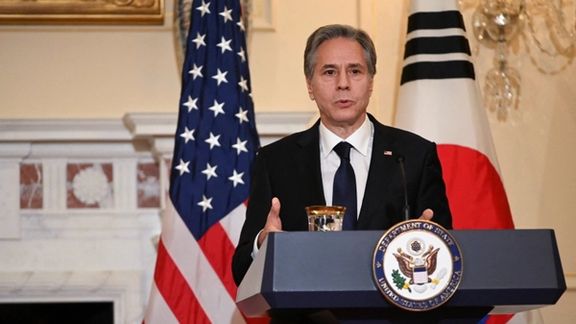
US Secretary of State Antony Blinken has signed a sanction waiver to allow the release of $6 billion of Iran’s frozen assets in a hostage release deal with Tehran.
The move will allow the funds blocked in two South Korean banks to reach Qatar without violating US banking sanctions imposed on Iran. According to the State Department document, Secretary of State Blinken determined that waiving the sanctions was in the national security interests of the United States.
Sources told AP that Blinken had approved the waiver last week, but Congress was only informed on Monday.
Both Washington and Tehran since announcing the prisoner release deal in August were hinting that the prisoner release deal and the unblocking of the funds were separate issues, but the waiver document clearly links the two as one agreement.
"Allowing these funds to be transferred from restricted Iranian accounts held in the (Republic of Korea) to accounts in Qatar for humanitarian trade is necessary to facilitate the release of these US citizens," the document said.
The news about the waiver came hours after an EU Commissioner expressed deep concern over the situation of Johan Floderus, a Swedish diplomat detained in Iran more than 500 days ago.

Floderus seems to be yet another victim of Iran's 'hostage diplomacy'. His case was kept secret for a long time by Sweden and the European Union in the hope that silence would secure his release.
On Monday, Ylva Johansson, the EU Commissioner previously responsible for Floderus's work, publicly addressed his case for the first time. "I'm very sad. I'm very worried," she said, “let’s hope that we can have him home soon”.
The long-kept secret of Floderus' plight first came to light in a New York Times report on 1 September. Shortly after, his family broke their silence and set out some details of his mistreatment in prison, including 24-hour lighting in the cell and over 300 days in solitary confinement.
Floderus turned 33 in prison last week.
In a statement published by a Swedish newspaper, Floderus’ family said he had spent some time in Iran on EU official business and had no issues. Sometime in early April 2022, he went back to Iran for vacation with his Swedish friends. On 17 April, he wanted to fly back home but was detained at Tehran’s international airport.
It’s not clear if Floderus had been advised against traveling to Iran on a personal capacity.
He has now joined a long list of foreigners and Iranian dual-nationals who in recent years have been detained in Iran and used as bargaining chips to force prisoner exchange or financial concessions.
Early August, four US dual-nationals were released from prison into house arrest in Tehran. Blinken said at the time that the move was the first step of a process to fly them home.
Opponents of the prospective deal say it encourages the Islamic Republic to detain more American and EU citizens.
Michael Rubin, a senior fellow at the American Enterprise Institute and a former Pentagon official, is a vocal critic of what seems to be the current EU/US policy towards Iran.
In a piece for Washington Examiner on Monday, he wrote: "When Iran brings a gun, Biden and his European partners wave cash. No wonder it is open season for Americans and Europeans worldwide."
Rubin lamented the 500-day silence over Johan Floderus' detainment and suggested that the authorities in Iran are looking to "trade him for Hamid Nouri".
Nouri is a former official of the Islamic Republic Judiciary who was arrested in Sweden and is now serving a life sentence for his involvement in the mass execution of up to 5,000 Iranian political prisoners in 1988.






